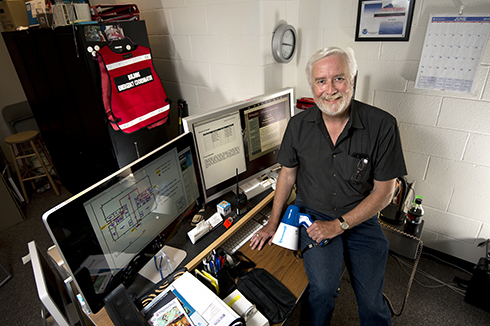Governor's Award nominee Brian Squibb recognized for ensuring workplace safety

Brian Squibb dedicates his time to ensuring that safety is always a priority at Virginia Tech.
Squibb works to make himself available to influence policies and procedures when it comes to the health and well-being of faculty, staff, students, and members of the community.
In addition to being the computer support technician for approximately 100 faculty and staff members, Squibb has also initiated a college-wide Committee on Safety and Security, led the College of Architecture and Urban Studies to become the first Virginia Tech college to establish an emergency action plan, and initiated the installation of an automated external defibrillator.
Squibb has dual responsibilities as both an information technology systems administrator and a research facilities manager. As a research facilities manager, he has taken a proactive approach to ensure that safe practices are being followed at Virginia Tech’s off-campus research facilities, which have been overlooked in the past. These facilities produced projects that received both national and international recognition.
“If it weren’t for the staff working behind the scenes, looking out for the health and well-being of these students and faculty, these types of projects would never be accomplished,” said Robert Schubert, associate dean for research.
Squibb has continually supported emergency preparedness in several efforts and was instrumental in helping Virginia Tech become StormReady. He motivates other faculty and staff to become involved by setting an example. He has earned 12 health and safety certifications, and participated in two Federal Emergency Management Agency workshops, and two workshops focused on threat and risk assessment.
“He not only immediately inspires confidence by being a good listener, he acts in a timely manner and provides appropriate information - he is not about inflating his importance -- but provides reliable information so one can confidently make a decision and act on it,” said Ron Angert, IT director and preparedness planner for the Division of Student Affairs. “Brian provides members of our university faculty and staff a positive model and a trusted partner in our efforts to make the student experience and learning outcomes at Virginia Tech unique."
According to co-workers, recently, when a false emergency occurred due to malfunctioning equipment, Squibb, who was on personal leave for the day, called in to find out what had happened and to offer his assistance. He immediately contacted the building emergency coordinators and floor wardens to ensure that the EAP was effective and had a report, containing strengths and suggested improvements, written by 11 a.m. the following day.
“Squibb’s genuine concern for the safety of students, faculty, and staff is obviously reflected in his dedication to the exemplary emergency management program, which he was chiefly responsible for developing,” said John Browder, professor and associate dean.
“Brian regularly displays the Ut Proism (That I May Serve) [university] motto beyond the university boundaries and out into the community,” said Lenora Stover, executive secretary in the School of Architecture+Design.
Squibb's proactive and "can do" spirit extends well beyond Virginia Tech and into the community where he gives freely of himself and his time. He is a Boy Scout leader, president of the Giles County Parent Teacher Organization, and Chief Radio Officer for the local Radio Amateur Civil Emergency Services (RACES). He continually promotes safe work environments, offers workplace improvements, and involves himself in all campus efforts to ensure that safety comes first. He is a model employee and a great friend to those who know him.
Dedicated to its motto, Ut Prosim (That I May Serve), Virginia Tech takes a hands-on, engaging approach to education, preparing scholars to be leaders in their fields and communities. As the commonwealth’s most comprehensive university and its leading research institution, Virginia Tech offers 240 undergraduate and graduate degree programs to more than 31,000 students and manages a research portfolio of $513 million. The university fulfills its land-grant mission of transforming knowledge to practice through technological leadership and by fueling economic growth and job creation locally, regionally, and across Virginia.




